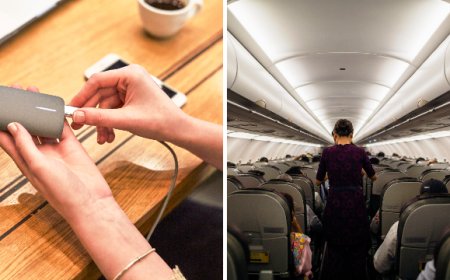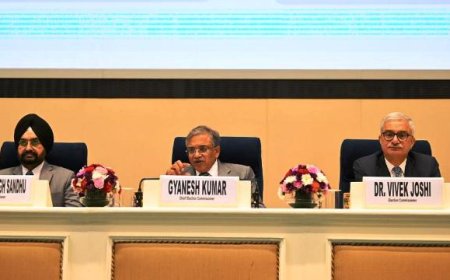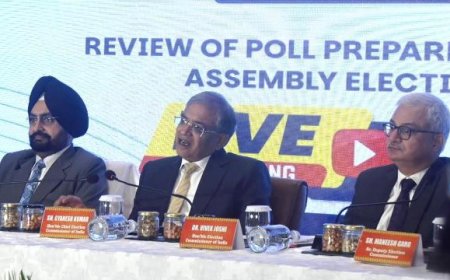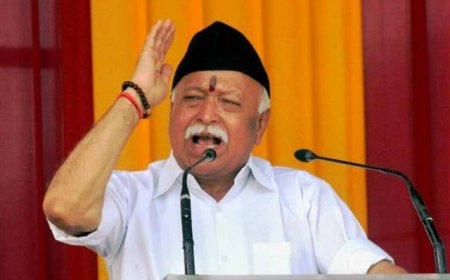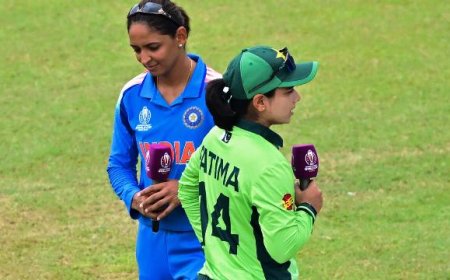CBSE announces updated syllabus for Classes 10, 12
The Central Board of Secondary Education (CBSE) has rolled out its updated syllabus for the 2025-2026 academic session, introducing several changes.

The Central Board of Secondary Education (CBSE) has rolled out its updated syllabus for the 2025-2026 academic session, introducing several changes aimed at enhancing the educational experience for students in Classes 9 to 12.
As per the latest CBSE notification, schools must follow new teaching methods, assessments, and subject structures aimed at making learning more practical and engaging.
TWO EXAMS FOR CLASS 10
Starting from the 2025-2026 academic year, Class 10 students will have the opportunity to sit for two board examinations annually—one in February and another in April. This initiative aims to provide students with a second chance to improve their scores within the same academic year. However, this policy is currently in its draft stage, and the final proposal is yet to be confirmed.
The Class 12 board examinations will continue to be held once a year, with the 2026 exams commencing on February 17.
REVISED GRADING SYSTEM
CBSE is transitioning to a 9-point grading system for both Class 10 and Class 12 board exams. Every 1/8th of passed students will be allotted one grade slot.

Under this system, marks obtained in examinations will be converted into grades more effectively, offering a more nuanced assessment of student performance. This replaces the previous five-point grading scale and aims to provide a clearer picture of students' understanding and capabilities.
PASSING CRITERIA FOR CLASS 10
To successfully pass the Class 10 board exams, students must secure at least 33% in each subject. In instances where a student fails in a core subject such as Science, Mathematics, Social Science, or a language paper but passes a skill-based or optional language subject, the failed subject can be substituted with the passed skill or language subject for result calculation.
For example, if a student does not achieve the required marks in Mathematics but passes a skill-based subject, the grades from the skill-based subject will replace those of Mathematics.
SKILL-BASED SUBJECTS IN CLASS 10
CBSE is placing a stronger emphasis on skill-based education by introducing subjects like Computer Applications (Code 165), Information Technology (Code 402), and Artificial Intelligence (Code 417) for Class 10 students. Additionally, students are required to choose either English or Hindi as one of their languages during Classes 9 and 10.
NEW SKILL ELECTIVES FOR CLASS 12
In alignment with the evolving educational landscape, CBSE has introduced four new skill electives for Class 12 students:
1. Land Transportation Associate
2. Electronics and Hardware
3. Physical Activity Trainer
4. Design Thinking and Innovation
These additions aim to equip students with practical skills relevant to various industries.
CALCULATORS IN CLASS 12 ACCOUNTANCY EXAMS
In a move to assist students in managing complex financial calculations, CBSE will permit the use of basic, non-programmable calculators during Class 12 Accountancy board exams starting from the 2025-26 academic session as per information from a CBSE meeting.
NEW TEACHING METHODS
CBSE's notification addressed to the heads of all affiliated schools note that the board is pushing for a shift in how students learn by promoting hands-on and inquiry-based education.
Schools must now adopt:
Project-based learning: Students will work on real-life problems instead of just reading about them.
Inquiry-driven education: Instead of memorising, students will be encouraged to ask questions and explore answers.
Tech-enabled learning: AI tools, digital resources, and online platforms will become a bigger part of classroom learning.
Collaborative lesson planning: Teachers will refine their methods dynamically to meet students' evolving needs.
The goal is to move away from rote learning and focus on understanding, problem-solving, and critical thinking.
COMPETENCY-BASED EVALUATION
CBSE is also revamping how students are assessed. Instead of just testing memory, exams will now focus more on real understanding and application of knowledge. Schools will design assessments that measure:
-Critical thinking
-Analytical skills
-Conceptual clarity
-Practical application of knowledge
This change aims to prepare students better for higher studies and careers by making learning more meaningful.
The detailed syllabi for Classes 9 to 12 are now available on CBSE's academic website. Students, parents, and educators are encouraged to review these documents to familiarise themselves with the updated curriculum and assessment frameworks.
What's Your Reaction?








